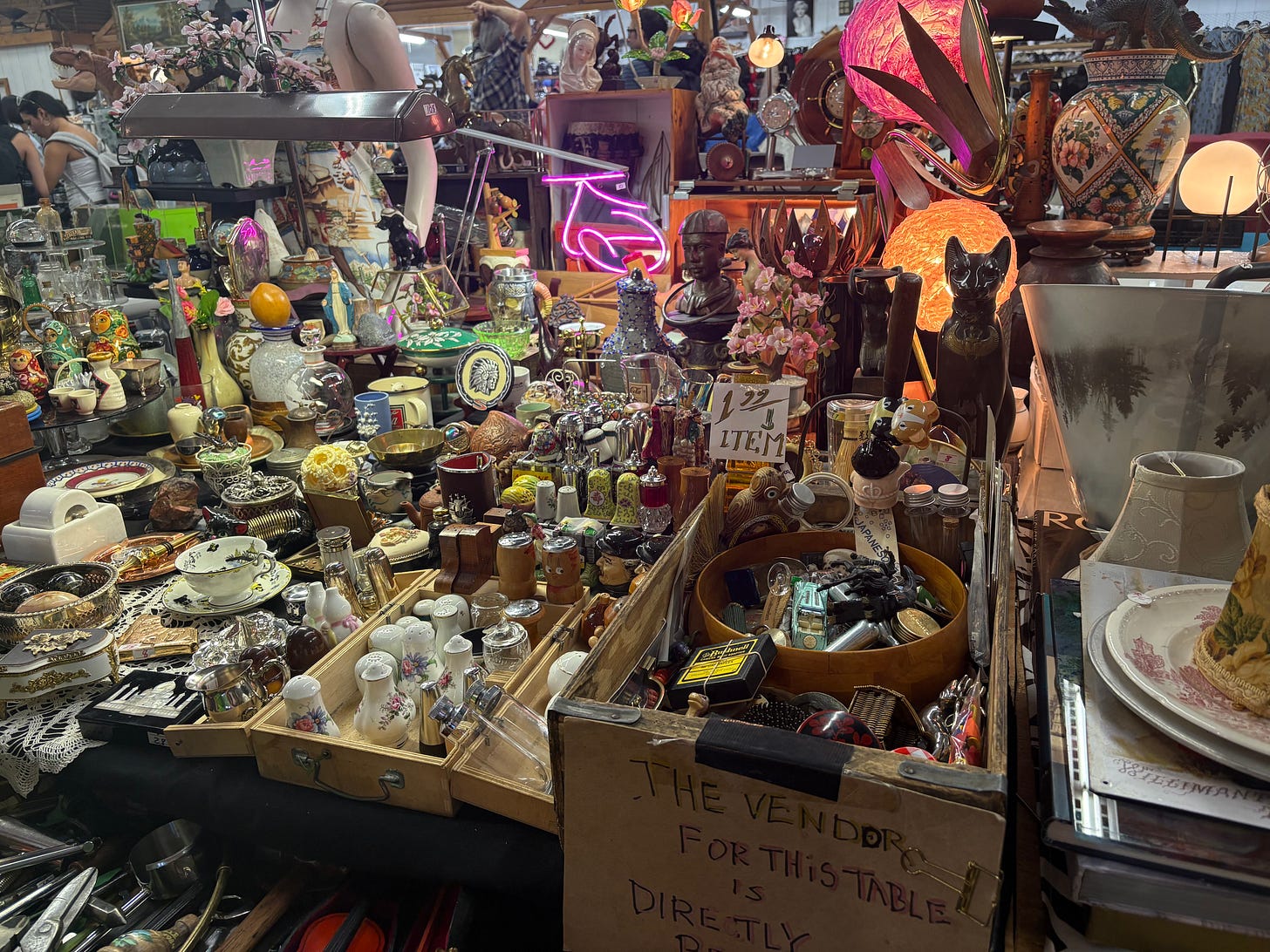Junk of the Heart
In Vancouver, I spent most of my time running along English Bay. On my last day there my family explored a flea market which was filled with what one might simply call detritus, perhaps speckled with rare treasures. Hundreds of collectible cars, tobacco pipes, screwdrivers, spare parts of a dyson vacuum, red heels, keyboards, dolls, glassware, faded pictures, cellophane, gum boxes. Someone’s entire living room and kitchen gutted out, thrown into a box and put on display. Call it eclectic hoarding or an unwillingness to let go of little sentimentalities.
It’s an odd act of devotion: the inability to give something up. People hold on to the past, though recollection takes different form factors. A little box of ephemera. A delightful record, a paperweight. More philosophically: a way of orienting oneself, an approach upon the world.
Sometimes these are good things. I marvel at the way pure love from parents is channeled into a child, for example. You can see it shining through their face, light as gossamer silk, inevitable. Love bestows upon them the gift of play, presence, unadulterated joy. Other times, someone’s past makes them fearful. They can hold on to disdain or paranoia, or protective mechanisms that make them close-hearted or hardens the soul.
Objects hold memories and gravity. I still keep all the letters I’ve ever been sent, even if said person is no longer in my life. Words are precious to me in that way. It’s impossible to return to a world where we said things and meant them. Proof of tenderness despite its departure elsewhere.
Loss is driven by the division or separation from other people, but also the immeasurable losses of our dreams, timelines, what we wished to pursue but gave up too early on, the dearth of fantasy, the end of magical thinking. It requires vigilance not to replace reality, or truth, of what something is with my fictional interpretation of what I wish it to be.
Many years ago, I listened to Junk of the Heart for an entire summer. It’s an old album by The Kooks, an upbeat Britpop band — it reminds me of walks by the Wharf, and the Maltby Street Market under the steel arches of London. I got very obsessed with the relationship between pain and love, The Kooks vocalist Kurt Pritchard said about the song title, you can't have one without the other. A reminded me of the Eternal Sunshine of the Spotless Mind, where a couple decides to rid themselves of precious memories together after the painful ending of their relationship. But in doing so, they purge the very vividness of life itself. Our memories, painful or pleasurable, make up the bedrock, the load bearing walls, of identity.
Objects remind us of the way things were. Such is the animal softness of memory. But all I can think about recently is how things are right in front of me, how they’ll never be this way again. So I’ll stop and watch my brothers clamor over the dinner table. I’ll let the splendor rise inside me like a tide. I’ll ask for what I want and ask a second time, a third. Attunement is being very present to the edge of experience, what Joe Carlsmith calls a meaning laden receptivity to the world.
Give it all, give it now, Annie Dillard says about writing well. It’s no good to hoard, to hold on so tightly.
One of the things I know about writing is this: spend it all, shoot it, play it, lose it, all, right away, every time. Do not hoard what seems good for a later place in the book or for another book; give it, give it all, give it now. The impulse to save something good for a better place later is the signal to spend it now. Something more will arise for later, something better. These things fill from behind, from beneath, like well water. Similarly, the impulse to keep to yourself what you have learned is not only shameful, it is destructive. Anything you do not give freely and abundantly becomes lost to you. You open your safe and find ashes.
I still have symbols or pendants of enchantment or history. I’ll carry my past selves with me as I go. But I don’t have to be so attached to the form they’ll take. Loss is funny that way, because you can’t hold onto anything, like water in your hands. At the same time, you never lose anything ever. I’ll remember the fundamental parts of you even if we don’t talk anymore; I can let go of my material possessions and I’d still ultimately know who I am. The immaterial provides deeper ways of seeing that feels more like grace.
PS: Thank you for reading. Starting from nix is a labor of love. If you feel inclined and would like to support; you could do one of any of these things: like, share, subscribe. Your support helps me curate more posts and reach more readers.




